This is a guest post by Jenny Austria, a France-based travel blogger.
When people learn I celebrated my 40th birthday in Rwanda, they ask, “But why?”
This East African country is known for two things: genocide and mountain gorillas. Not your milestone birthday vibe, right?
The ‘Land of the Thousand Hills’ offered exactly what my husband and I love: nature and wildlife.
Rwanda is incredibly green, and they weren’t kidding about having a “thousand hills.” We had two weeks of endless rolling hills, tea plantations, volcanoes, tropical rainforests, and lakes.
Truth is, I was intrigued.
Here’s a country that had a brutal humanitarian crisis only 30 years ago. Yet it turned into a luxury destination where single-use plastic is banned, and a nationwide cleanup day is mandatory each month. Oh, and did you know women hold the majority of seats in Parliament?
It’s a small, safe, and clean country that’s easy to explore by car. Here are some of the best things to do in Rwanda:
1. Reflect at a genocide memorial
In the 1994 genocide against the Tutsis, Hutu militia murdered over 1 million people in 100 days.
We visited the Nyamata Church Genocide Memorial south of the capital. It was a Catholic church where thousands sought refuge, only to be killed. The guided tour is by donation, and for obvious reasons, no photos are allowed inside.
Warning: Be prepared to see up close bloodied clothes, skulls damaged by weapons, and bones in half-opened coffins.
Despite having already visited memorials in other countries, seeing children’s clothes and hearing the story of the woman buried onsite still made me feel sick. I wish I could forget the “old textiles” smell in the crypts, but I can’t.
If you feel such an experience could be too much, opt for the well-known Kigali Genocide Memorial. It’s a serene, well-organized museum with exhibits and audio-visual guides. It’s also the resting place of 250,000 victims.
2. Visit the Ellen DeGeneres Campus of the Dian Fossey Gorilla Fund
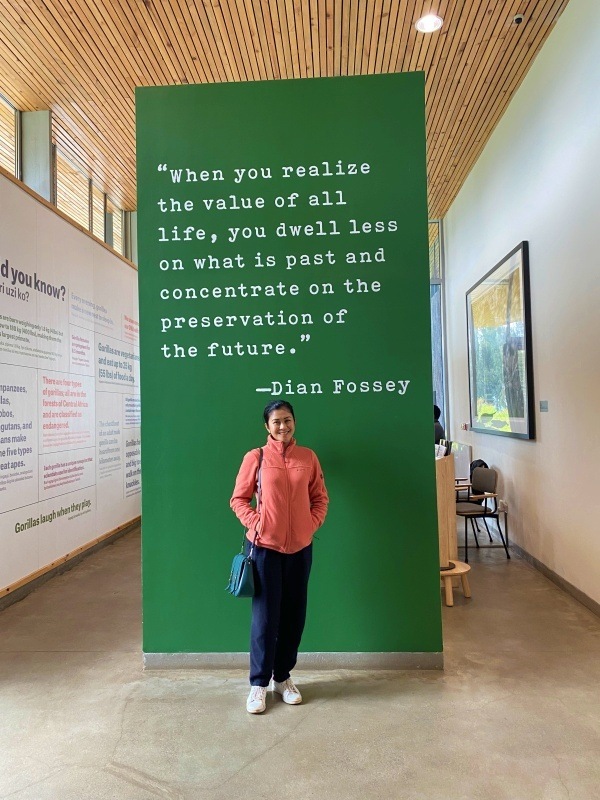
This place was the reason why we spontaneously decided to do gorilla trekking in Rwanda instead of Uganda.
Portia de Rossi gave this campus to her wife, Ellen DeGeneres, as a 60th birthday gift–honoring the TV host’s childhood hero, Dian Fossey. The museum was so inspiring that we said, “We’re already in the Virungas. It’d be crazy not to see the gorillas here!”
There’s a replica of Fossey’s mountain cabin (where she was murdered), complete with her desk, typewriter, and other personal items. Can you imagine how dangerous it was for her in the ‘60s, studying little-known gorillas in a remote area with civil unrest?
If you want to learn more about the primatologist, I recommend reading her book Gorillas in the Mist (1983) or watching the 1988 film of the same name, starring Sigourney Weaver.
There’s also an onsite café and gift shop. I took a fun quiz to match my personality with one of Dian’s gorillas and bought gorilla nose prints (they’re like fingerprints for humans) as souvenirs.
3. Trek to observe mountain gorillas in their home
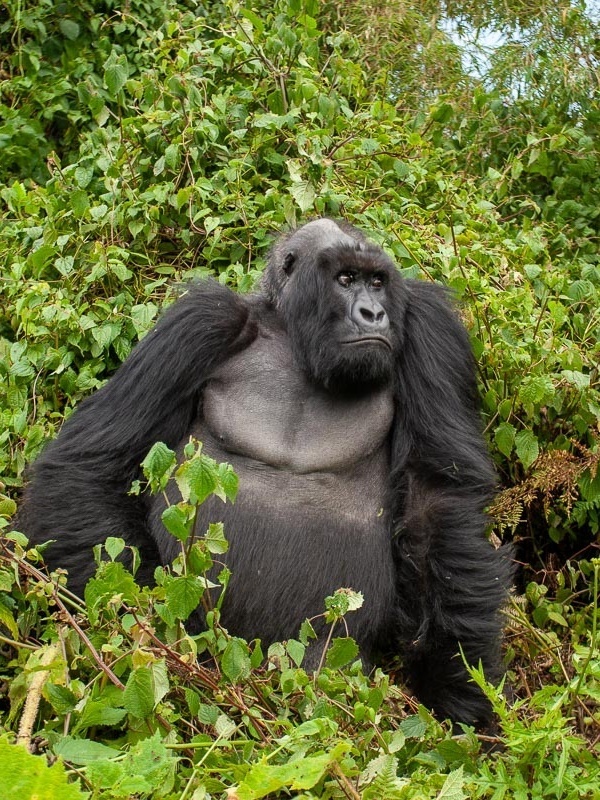
Endangered mountain gorillas live in only three countries: Rwanda, Uganda, and the Democratic Republic of Congo (DRC).
Gorilla trekking is a once-in-a-lifetime experience, but it comes at a price—US$1500 per person for a permit. In comparison, it costs US$800 in Uganda and US$400 in DRC.
Our hike took about 30 minutes, but it can take longer depending on how quickly you find a gorilla family. You don’t need to be super fit, but be careful—it can get muddy and slippery. At the very least, you must be physically healthy, have good balance, and be okay with bulldozing through prickly nettles.
During the briefing, our group leader taught us ‘gorilla ‘language,’ a low grunting sound like clearing your throat. We had to wait for the silverback to respond with this grunt before we could approach. Once he okayed, we spent an incredible hour observing them in their natural habitat.
As gorillas are susceptible to human diseases, it is mandatory to wear a face mask.
Tips:
- Support local jobs by hiring a porter. Though you can do without, we found them very helpful, especially on slippery paths. The cost is about US$10 per porter, but you can tip more if you’d like.|
- If you travel between March and November, you can get a 30% low-season discount on gorilla permits (US$1050 instead of US$1500) by combining the trek with visits to other Rwandan national parks. The discount wasn’t mentioned to us when we bought our permits, so be proactive about it. Submit paid receipts for hotels and activities here BEFORE your trek, as discounts cannot be claimed retroactively-something I learned the hard way.
4. Discover the beauty of Twin Lakes

Lakes Ruhondo and Burera, formed by volcanic activity, are twin lakes in northwestern Rwanda near Musanze (gorilla trekking base) and the Ugandan border.
I booked an avocado treehouse on Airbnb for a peaceful, do-nothing birthday, surrounded by banana trees, lakes and volcanoes. I craved a different vibe from our usual things to do in Provence, where we live in France.
A quick 10-minute boat ride took us back to the mainland for tours. We booked hikes with Beyond the Gorillas Experience and a beekeeping experience with a villager.
Hike Rwanda’s scenic trails
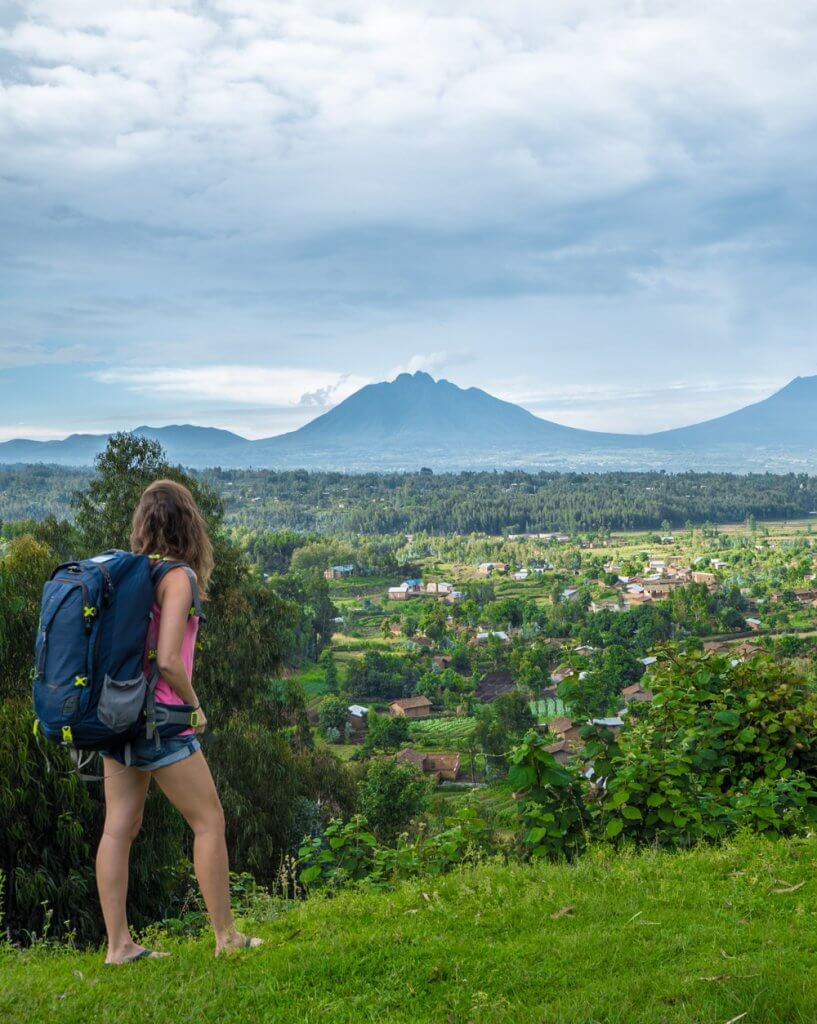
Rwanda has no shortage of hiking trails. But some need mandatory guides since you’ll be trekking through national parks with potential wildlife encounters.
We stuck to easy-to-moderate hikes. We didn’t feel physically prepared for more advanced hikes such as Mount Bisoke (3700m), Mount Muhabura (4127m), and Rwanda’s highest peak, Mount Karisimbi (4507m).
Little-Known Tip: If gorilla trekking isn’t in your budget, just book a hike around Volcanoes National Park. You could spot golden monkeys and gorillas, and the odds are high. But here’s the catch: if you see wild gorillas without paying the US$1500 fee, you’re not allowed to take photos or videos.
Track chimpanzees in Nyungwe Forest National Park
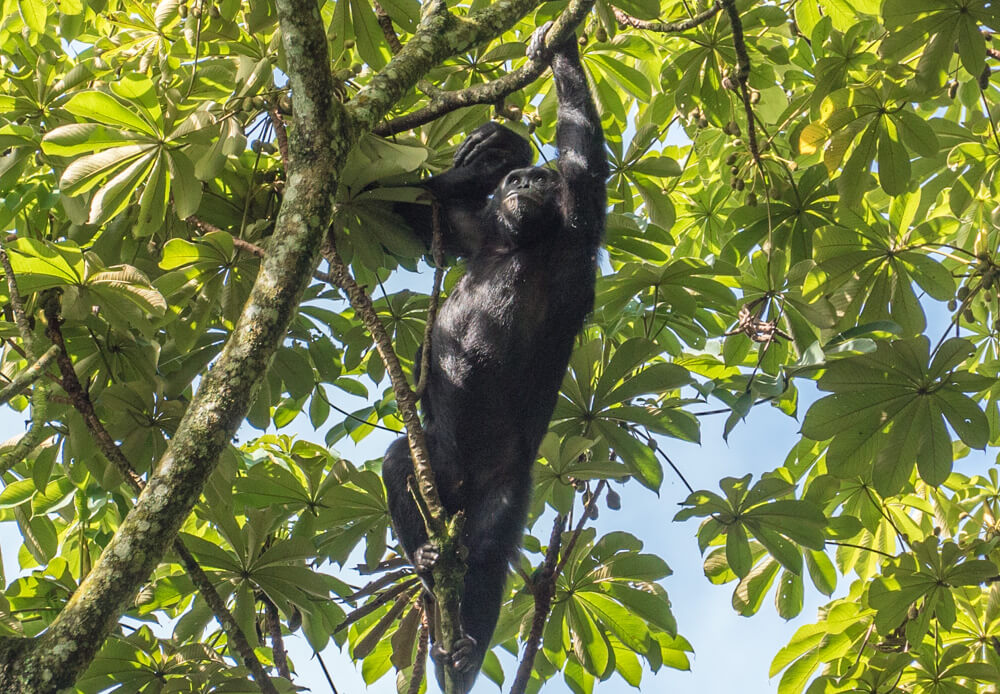
Thank goodness I don’t have asthma attacks anymore, because “out of breath” sums up my experience.
Unlike watching stationary gorillas, chasing chimps is pure adrenaline—they’re fast, swinging through trees or knuckle-walking on the ground. And you’re right there with your guides trying to keep up.
Two things I learned that day: 1) Their piercing screams are scary, and 2) Chimps can eat baboons (our guide even had a video).
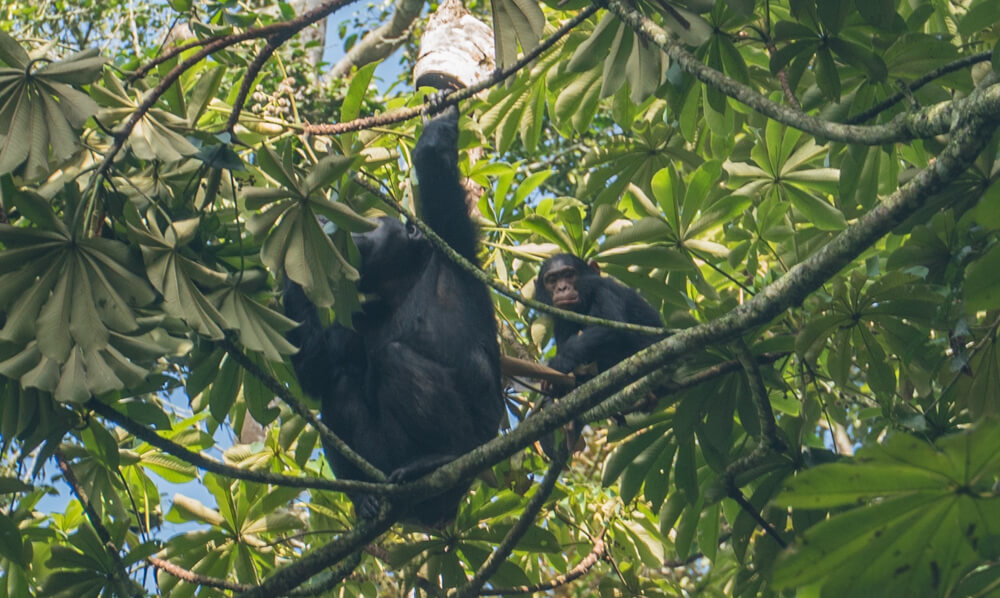
Since it was low season, we were able to secure permits the day before. Otherwise, be sure to book ahead, as there are only three chimpanzee communities, each with a limit of 8 visitors per day.
We paid US$250 per person ($100 for park entry, $150 for tracking permit) as day visitors.
Spend a night in Gishwati-Mukura National Park
Gishwati-Mukura National Park is home to 20 chimpanzees and other primates like L’Hoest, blue, and golden monkeys. It’s so exclusive that you can’t visit without staying at the Forest of Hope Guest House and Camp Site.
The catch? Only about 12 people can stay overnight in the entire park—four in the guesthouse and eight at the campsite.
Staying at the lodge costs about US$250 per person per night, including all meals, guided hikes, and visits to the local community where you can learn about plant medicine and crafts.
I loved the ethos behind this ecotourism experience, so I WhatsApp’ed the park manager to get on the waitlist and even lingered around Lake Kivu, hoping for good news. Sadly, the only available slots were for the weekend we were leaving Rwanda.
Learn more about this unique experience at the park’s official site.
Go on a safari in Akagera National Park
Akagera is the go-to spot for a safari in Rwanda. Located in the east near the Tanzanian border, it’s a three-hour drive from Kigali.
Since the 1994 genocide, the park has undergone an impressive revival and is now home to the ‘Big Five,’ along with giraffes, zebras, and over 490 bird species.
It’s a self-drive park (entrance is US$100 per person), but hiring a guide (starting at US$25) is key if you want to spot wildlife instead of driving aimlessly. You can also stay overnight at one of the park’s lodges. If you go, don’t miss the boat ride on Lake Ihema to see hippos and crocs.
Check the official website for more details on fees and rules.
Marvel at the mysterious Lake Kivu
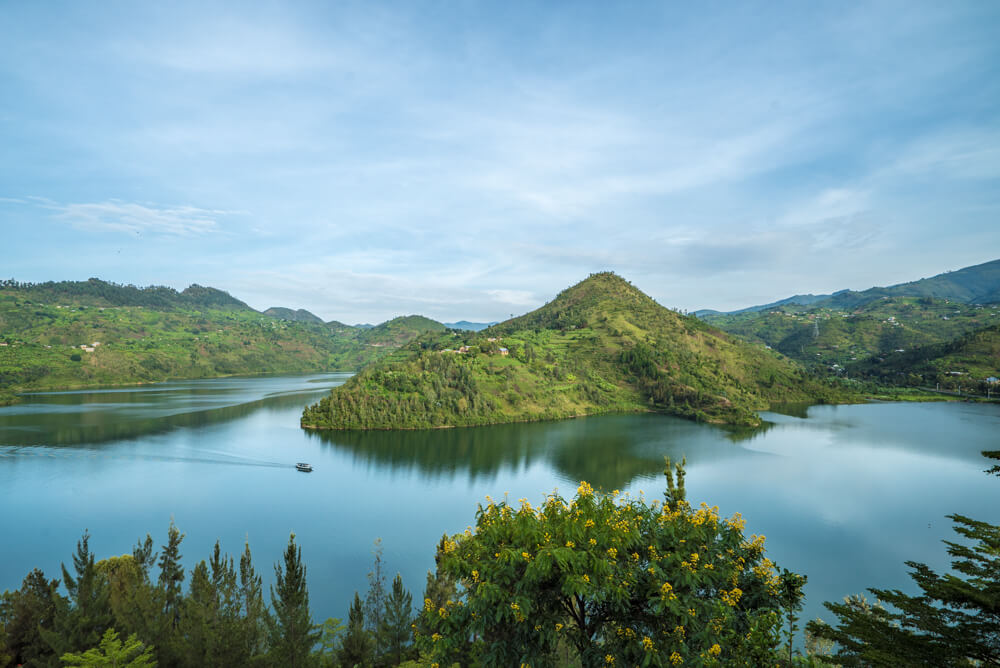
Lake Kivu, Rwanda’s biggest lake, is shared with the Democratic Republic of Congo. It helps supply Rwanda’s electricity, thanks to copious amounts of methane in its deep waters.
But the lake has a secret. Scientists warn it could one day explode.
We enjoyed views of Lake Kivu from various points as we drove from north to south. If you’re planning a visit, popular resort towns like Gisenyi, Kibuye, and Cyangugu offer plenty of activities—boating, birdwatching, or chilling by the water.
Relax lakeside in Kibuye
Halfway through our trip, we decided to chill in Kibuye by Lake Kivu. Our rental car broke down (for the third time!), and we needed to wait for repairs.
We couldn’t do any water activities, but we didn’t mind doing nothing. I’ll always remember those relaxing days by the lake, getting massages, eating fresh tilapia and sambaza (sardine-type Kivu delicacy), and drinking cold Virunga Mist beer.
Tour a lush tea plantation
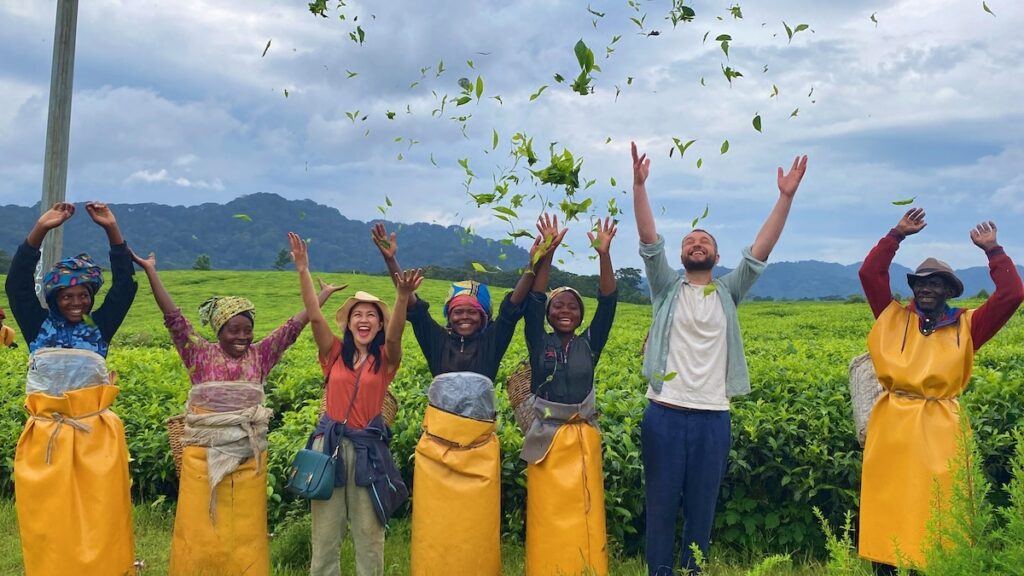
If you think tea picking is boring, you’re in for a surprise.
We walked through the fields, learned how tea is grown, and even spotted a great blue turaco. Tea harvesters are paid by the weight of the leaves they pick, so rainy days are a bonus since wet leaves are heavier.
The highlight was picking tea leaves with the workers. How’d I do, you ask? Gloriously slow. We ended the tour by tossing leaves for good luck.
Tea plantations don’t deal with tourists directly, you’ll need to ask your hotel or book through a local tour agency.
Learn traditional Rwandan beekeeping
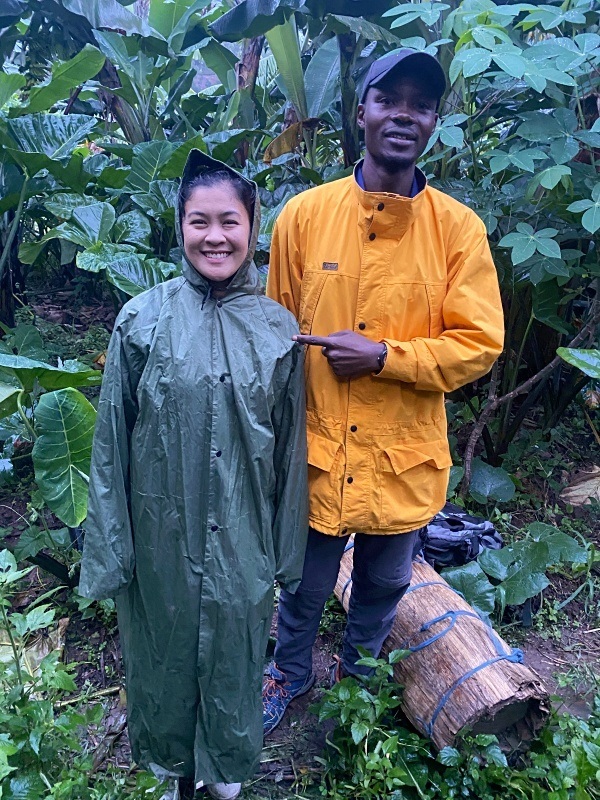
Did you know Rwandan beehives are sealed with cow dung?
We booked a beekeeping tour with a villager near the Twin Lakes. Imagine our surprise when we had to wear ordinary raincoats as protective gear. I didn’t know if I should laugh or cry. Luckily, I didn’t get stung.
Sip freshly brewed coffee across Rwanda
As someone who can’t function without morning coffee, I often worry about finding good options when I travel. Not in Rwanda.
Coffee culture is so alive, you’d see cafés and coffee-washing stations all over the country. I tried cafés every chance I got. My favorites were Question Coffee in Kigali, Crema in Musanze, and Kivu Cup in Kibuye.
Tip: If you want to take Rwandan coffee home with you, buy from supermarkets where it’s cheaper vs. specialty cafés. A popular brand is Gorilla’s Coffee, the same brand used at the Ellen Degeneres-Dian Fossey campus.
Enjoy Kigali’s modern dining scene
Since many expats live in Kigali, it’s no surprise the food scene is sizzling. Choices galore!
We had Indian food at Kurry Kingdom, Belgian-French at Poivre Noir, even Southeast Asian (how specific!) at Soy Asian Table. If we had more time, I’d have stayed to try more restaurants, like Afro-fusion cuisine at MEZA Malonga.
Admire the work of Rwandan artists
Kigali has plenty of art galleries. We visited the Niyo Arts Gallery that features the work of local artists. I loved a painting of Rwandan mothers carrying babies on their back, a typical countryside scene. There’s an adjacent café with lovely interiors and great coffee.
Shop for unique souvenirs at Kigali’s Caplaki Market
Caplaki is a great spot to hoard souvenirs. I bought wooden gorilla and giraffe bookends, magnets, and wooden crafts.
If you’re traveling around Rwanda, it can be tempting to grab items along the way, especially near the gorilla trekking areas. But if luggage space is tight, save your shopping for Kigali and stop by Caplaki before heading to the airport. Just be ready for persistent sellers!
Visit Hôtel des Mille Collines from “Hotel Rwanda”
Famous for sheltering 1300 people during the genocide and inspiring the film Hotel Rwanda, four-star Hôtel des Mille Collines is now a popular spot in Kigali.
On our last day, we decided to have lunch poolside, where it was packed with sunbathing guests. Honestly, the food was overpriced and disappointing, but I’m glad we visited the place for its history.
Final Thoughts
I didn’t research much before going to Rwanda. Its dark past and famous gorillas were all I needed to know, and I wanted the rest to be a surprise.
Poised to become the ‘Singapore of Africa,’ Rwanda is one of the cleanest, safest countries on the continent. I was thrilled to see a clean, thriving capital like Kigali, contrasted with the raw beauty of the countryside.
While Rwanda markets itself as a luxury destination, I found there’s something for every budget. It’s a good choice for anyone who may not be ready for the more rugged parts of Africa, but still want to experience the continent’s rich culture and wildlife.
It’s hard to believe that a genocide happened here just 30 years ago. What a privilege to see how far they’ve come.
About the author: Jenny is the voice of The Luberon Spy, where she writes about the famous Luberon villages of Provence, France. Get helpful tips, travel guides, and village stories from a local who’s bursting with unsolicited advice just for you.
Ruth says
Hey Kristin, i’ve been a reader of your blog for quite some time now and i love that you went to Rwanda! When you did a reader’s survey in 2015, i wrote that i’d love to follow you going to africa. Rwanda and Tanzania are the two countries i’ve visited in Africa so far and i’m so stoked to see that you went there! For me, Rwanda was a magical place and so different to the places i’d been before. The lush green scenery still makes me dream.
Your an inspiration and i always feel empowered by your texts (regarding the issue of travelling as a woman)!
A suggestion: stop putting off going to India (as you wrote somewhere i believe) and come here! It is beautiful, surprising and i’m constantly in awe! This is my first longer trip far away on my own/with a friend and i absolutely love it.
Kind regards from Jaipur
Ruth
Kristin says
Thanks for the encouragement! I do need to go, I’m just scared but I shouldn’t be! Glad you’ve enjoyed the Africa content <3
Scott says
For a first timer to Africa, would you recommend Rwanda over Tanzania? How would you rank them, South Africa, etc, and the other countries you’ve been to?
Kristin says
TBH South Africa is first, then Mozambique and Namibia, and Tanzania is awesome too. I had a hard time with Rwanda. The locals tended to DEMAND money from me. Not beg but demand and totally mob me when I got out of the car. That puts a bad taste in one’s mouth
Scott says
Good to know! I love your blog and respect your opinion so much!
Grainne says
It looks incredible! I hope to get to Africa someday!
Ijana Loss says
To be honest I’ve never given Rwanda much thought! Glad to hear about some cool stuff there, if I ever make it to that part of the world I’d love to tack Rwanda onto a Tanzania/DRC trip
Kristin says
I’d really like to make it to the DRC too!
Xinen says
Which airbnb did you stay in! Am headed to Rwanda next!
Renaud says
Nice To read that you loved your trip. We were there 2 years ago and it was a trip of à lifetime!
Emma says
Hi Kirsten! I was just wondering what country you got your yellow fever shot in, or if you got one at all? Do you think it would be possible to get such a vaccination while on the road as an American? Say in South Africa? Thanks for any insight!
Kristin says
South Africa is exactly where I got mine, and for way cheaper than at home. I visited this one twice for vaccines and anti malarials and love the doctor there: http://www.joburgdoctor.co.za/changes_made_in_july_002.htm
David Frederick says
Great blog, Kristin, thank you!
I just wanted to pick up on your comment that “the locals tended to DEMAND money from me. Not beg but demand…” That statement stood out like a sore thumb and totally at odds with the main blog! I am planning a solo bicycle trip — not even the protection of a car! — and if I am subjected to this constantly, or more or less constantly, then I may rethink things. So my question: does what you are writing about apply generally in Rwanda? Thanks, and again, great blog.
Kristin says
I think this may have been because we were in a car, and it might have appeared we had money? Hard to say what your experience will be. It could be totally different. It was just a hard part of the trip there for me, I’m sorry to say.
Gibert says
Hello Kristin, i like the way you described your experience in my country, i have been to all the places you visited and your words managed to take me back there. You didn’t have much time, but if you come back, I would personally recommend the Ethnographic museum in Huye/Butare, it’s 2 hours from Kigali, midway Between Kigali and Nyungwe National park. It’s the biggest in East¢ra Africa and its full of pre-colonial history, art, and artifacts, really comprehensive.
On behalf of my fellow citizens, I’m really sorry you had that experience. Usually, Rwandans are polite and very welcoming with foreigners, but It is also true that we still have a lot of NGO’s, volunteers, missionaries and charity tourists due to our history, and it creates in some, an expectation of handouts/gifts towards white people or wealthy looking people in general. It’s rare in Kigali where I live, but more prevalent in non-touristic rural places because the few foreigners they see are generally there doing charity.
I hope that negative experience won’t prevent you from coming back to Rwanda, there is a lot more to see and eat, plus I’m very proud to say that Rwanda is the safest country on earth for women to walk home from work at night, i hope saw it for yourself during your brief stay.
Merry Xmass and HappyNew Year Kristin
Kristin says
Thank you for your kind words, Gilbert! I don’t blame anyone for doing what they need to do in order to survive. I know colonialism and wealth disparity have created this situation and I hope I didn’t come across as insensitive.
Chris says
Howdy Kristin,
Just back from some Rwandering myself and I felt it’s worth mentioning that barely anyone begged, let alone demanded, money from us wherever we self-drove. Lots of stares and curiosity, but that’s a given in any lesser-visited country, right?
Thanks for the Rwanda tips, which we used in our planning. We managed to squeeze in the Mount Bisoke hike, so if anyone’s looking for info on that, roll on over to our blog, The Unconventional Route (after you read a million posts in Kristin’s blog, of course!) for our guide.
Toodaloo everyone!
Kristin says
That’s good! Maybe things have changed since I was there.
Golden Rwanda says
Rwanda can be termed to be the world’s only country that boasts of having women representatives comprising about 64% of the government. A vital progressive stance taken here is gender-based equality something that is considered to be a classic example that the world has taken note of. Even the safari lodge in Rwanda